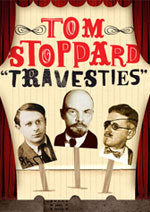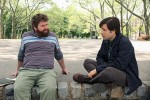by Jas Faulkner
 Carr: Artists are members of a privileged class. Art is absurdly overrated by artists, which is understandable, but what is strange is that it is absurdly overrated by everyone else… When I was in school, on certain afternoons we all had to do what was called Labour-weeding, sweeping, sawing logs for the boiler-room, that sort of thing; but if you had a chit from Matron you were let off to spend the afternoon messing about in the Art Room. Labour or art. And you get a chit for life? Where did you get it? What is an artist? For every thousand people there’s nine hundred doing the work, ninety doing well, nine doing good, and one lucky bastard who’s the artist.
Carr: Artists are members of a privileged class. Art is absurdly overrated by artists, which is understandable, but what is strange is that it is absurdly overrated by everyone else… When I was in school, on certain afternoons we all had to do what was called Labour-weeding, sweeping, sawing logs for the boiler-room, that sort of thing; but if you had a chit from Matron you were let off to spend the afternoon messing about in the Art Room. Labour or art. And you get a chit for life? Where did you get it? What is an artist? For every thousand people there’s nine hundred doing the work, ninety doing well, nine doing good, and one lucky bastard who’s the artist.
from Travesties by Tom Stoppard, 1974
This passage from Tom Stoppard is one of the few in western arts and letters in which someone outside of the circle of creative minds confronts an artist (or writer or actor or musician or…) about what they see as a less than useful way to spend a life. Amid the streaks of Hooker’s Green envy that permeate this speech is something much subtler. The tell is the penultimate sentence: What is an artist?
A creator is someone who creates. A writer is someone who writes. An actor is someone who acts. An artist is someone who arts…er, paints, draws, sculpts and so on. To people whose work takes them outside of this realm, it looks (sometimes justifiably) like so much playing around. As a group, authors tend to encourage the idea that writing is something that is done when there is nothing better to do by creating onscreen scribes who seem to do everything but write. Jessica Fletcher (Murder, She Wrote), Richard Castle (Castle), and Jonathan Ames (Bored To Death) solve crimes, Carl Kolchak (Night Stalker) chases monsters and Charlie Kaufman (Adaptation) wanders around in a daze, alternately screaming back at his blocked creativity and sinking deep into his own Walter Mittyish fantasies. Even when writers try desperately to stay on task, they are sometimes dragged into adventures not of their own making. Just look at poor Karen Eiffel (Stranger Than Fiction). All the woman wants to do is finish her novel, and one of her characters cocks this up by insisting on living beyond the moment she types “F-I-N”.
To be fair, the act of writing is a rich cerebral playground for the person actually doing it and creamed, chipped  tedium on very dry toast for anyone watching.* Would anyone really want to witness someone sitting at a desk for ninety minutes? How much cinematic appeal is there to fifteen minute spates of feverish typing followed by side forays into checking the mail, staring off into space, getting the giggles at George Takei’s Facebook page and waiting for phone calls to conduct interviews? The tedium and frustration that go along with the triumphs of seeing a by-line, their name below the title or on the spine of a book are things that inform what can be funny about the enterprise.
tedium on very dry toast for anyone watching.* Would anyone really want to witness someone sitting at a desk for ninety minutes? How much cinematic appeal is there to fifteen minute spates of feverish typing followed by side forays into checking the mail, staring off into space, getting the giggles at George Takei’s Facebook page and waiting for phone calls to conduct interviews? The tedium and frustration that go along with the triumphs of seeing a by-line, their name below the title or on the spine of a book are things that inform what can be funny about the enterprise.
In his late, lamented HBO series, Bored to Death, Jonathan Ames poked fun at the lives of creative professionals. In this excerpt, his alter ego (played by Jason Schwartzman), converses with his friend, Ray (Zach Galifinakis) who happens to be a struggling comic book artist:
Ray: Just yesterday, Leah was like, “Why don’t you go teach art at a public school?”. I’m not going to teach art at a public school. I don’t wake up until eleven am. Go teach art…
Jonathan: And if you did it would be a steady income.
Ray: Don’t be disgusting.
from Bored to Death by Jonathan Ames, 2008
The exchange is funny, but there is also a grain of truth to it. Devotion to anything that one hopes will eventually pay but falls outside of the part of the vocational Venn diagram that covers hourly or salaried jobs is something seen as crazy by the rest of humanity. It echoes the oft told anecdote that Penn and Teller decided to move forward with their drive to be performers and swore they’d taken their last non-show business job from there on out.
I was reminded of this the other day by a friend who owns a small USB in Mississippi. She does a brisk business, hosts writers as she can get them and offers all kinds of activities to make sure books end up in eager hands even when there isn’t enough money to pay the low prices she charges. Owning a book store was her dream even back in the late eighties when we were in school together. She sees it as her mission to keep a book store open in her little town so that a place with books is just a short drive from their homes, if not a short walk away. A large chain recently offered to buy out her little store. Out of curiosity, she asked if they planned to open one of their own store in its place. They told her if their newest store, in a city a little over eighty miles away, did well, they would consider it. They said it would take five years or more to decide.
A lot can happen in five years. A five year drought of books for her little Mississippi town could mean a lot of potential readers might fall between the cracks and not get the chance to start personal libraries of their own. And even if the Big Chain came in sooner, would there be books those people could afford? Would they be able to get someone else’s castoff copy of Sounder or Salem’s Lot for a quarter?
Doubtful.
She told the Big Chain people, “no.” They asked her to think about it, but being a very polite and thoughtful person, she explained that she didn’t want to take up more of their resources. She had her answer and wanted to give it without much trouble or fanfare.
“You’re going to love this,” she said to me, laughing as she continued. “Then they told me I was playing at having a store and that I needed to get a real job. For a minute, I knew what it was like to be a writer.”
“No kidding,” I said.
She sighed. “Well actually, last Sunday, someone at church asked me what I did. I told them and they said, ‘Yeah, but what do you really do?’.”
Maybe it’s time to consider purveyors of books as the next potential meta-literary heroes.
*Jas Faulkner’s last three ex-boyfriends agree: Writers are boring.

I’m glad I found this article on Google so well written, long look information about this topic. You write very well talented, keep up the good work. good luck